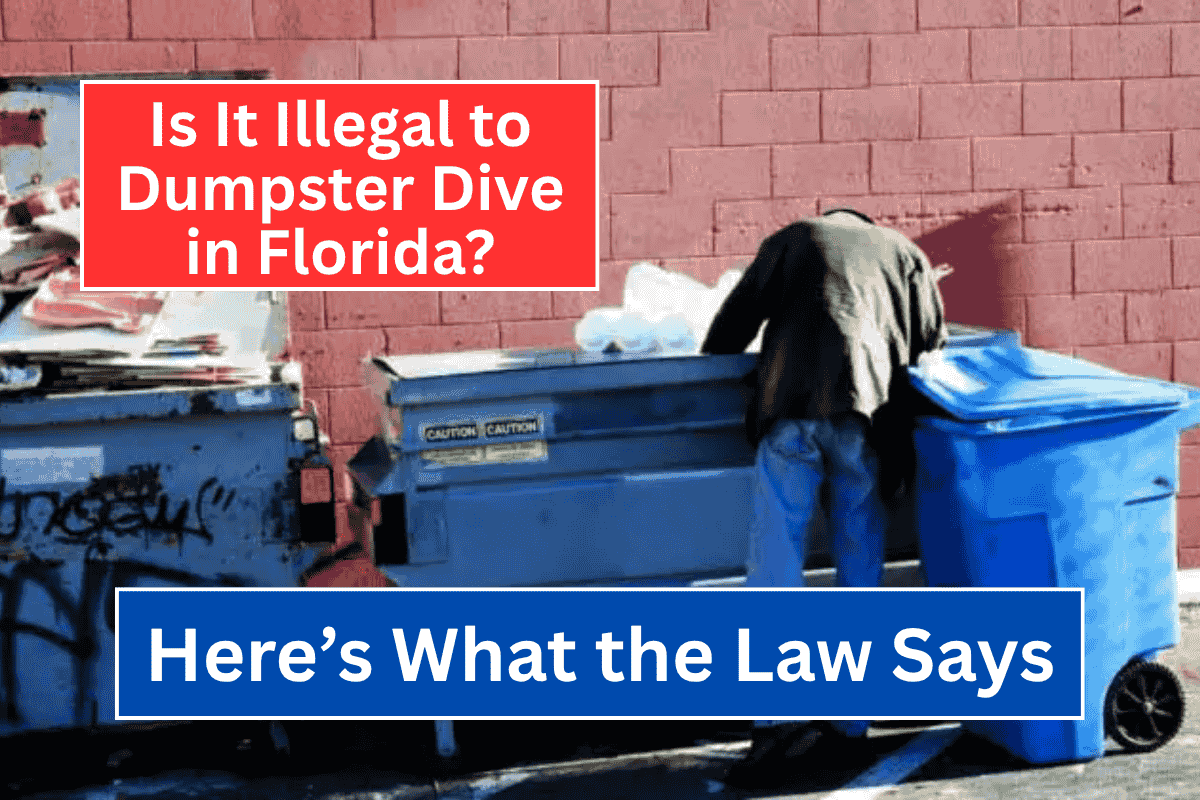Dumpster diving might sound unusual, but for many, it’s a way to find usable items that others have thrown away. Some people do it for recycling, some for reselling, and others just for the thrill of the hunt. But in Florida, is it legal? Let’s break it down in clear, simple terms so you understand exactly what’s allowed and what’s not.
What Is Dumpster Diving?
Dumpster diving means looking through trash bins or large dumpsters to find useful items like food, electronics, furniture, or recyclables. It’s also called junk picking or trash hunting. Many people do it in commercial areas, outside retail stores, restaurants, or offices where valuable things might be thrown away.
Is Dumpster Diving Legal in Florida?
Yes, dumpster diving is generally legal in Florida, as long as you’re not breaking other laws like trespassing or creating a mess. The law allows people to go through trash that has been discarded in public spaces.
What the Law Says
A U.S. Supreme Court ruling in California v. Greenwood (1988) made it clear that once trash is placed in a public area for collection, it no longer has privacy protection. This means anyone can search through it—including in Florida.
Florida Law at Different Levels
Just like a funnel, Florida’s laws go from broad to detailed—federal, state, county, and city laws all play a role.
Federal Law: Dumpster diving is not a federal crime.
State Law: Florida doesn’t ban dumpster diving.
County & City Laws: Local rules may vary. Some areas may have restrictions about where or when you can go through trash.
So before you go diving, it’s smart to check with local laws in your area.
When Is Dumpster Diving Legal?
Dumpster diving is legal when it’s done:
On public property, like sidewalks or public parks
Without trespassing on private land
Without damaging the dumpster
Without causing a mess or disturbing the peace
If you’re diving behind stores where dumpsters are accessible to the public, you’re likely on safe legal ground—as long as there are no signs saying otherwise.
When Is Dumpster Diving Illegal in Florida?
Even though it’s legal in general, here’s when dumpster diving crosses the line and becomes illegal:
1. On Private Property Without Permission
If you enter someone’s yard, a locked gate, or behind a store that has “No Trespassing” signs, it’s trespassing, and that’s a criminal offense.
2. If You Damage the Dumpster
Breaking locks, bending lids, or damaging the container is vandalism and can lead to fines or arrest.
3. Making a Mess
Leaving trash scattered around or dumping your own garbage is considered littering, and you could be cited.
4. Causing Disturbances
Shouting, loud music, blocking paths, or bothering others while diving can be viewed as disorderly conduct.
5. Diving into Locked Dumpsters
If a dumpster is locked or behind a fence, trying to access it is illegal—even if it looks like no one is using it.
6. Ignoring Warning Signs
Signs that say “Private Property” or “No Dumpster Diving” carry legal weight. Ignoring them could lead to charges of trespassing.
Why Do People Get Arrested for Dumpster Diving?
Although dumpster diving is legal, people often get arrested for related actions—not the diving itself. Common reasons include:
Drug possession (like in the Best Buy case)
Trespassing on private property
Damaging property
Stealing company-sensitive items
So, it’s not the act of diving, but what’s done around it that can get someone into legal trouble.
How to Stop Dumpster Diving on Private Property
If you’re a property owner or business manager, here are ways to deter or stop unwanted dumpster diving:
Use Sturdy Locks: Install heavy-duty lock bars on dumpster lids.
Use Trash Compactors: These crush waste and leave little for anyone to find.
Install CCTV Cameras: Use rotating or AI-powered cameras for full surveillance.
Post Warning Signs: Signs like “No Trespassing” or “No Dumpster Diving” help protect your rights.
Remote Video Monitoring: Real-time monitoring helps catch and deter unwanted activity instantly.
What Can Dumpster Divers Find?
Dumpster divers often find:
Furniture
Old electronics
Office supplies
Packaging material
Leftover food from restaurants
Clothing
Sometimes even sensitive documents
Businesses need to be careful about what they throw away, as items like passwords, medical records, and personal information can be misused if found.
In Florida, dumpster diving is legal in public spaces, but it becomes illegal when it involves trespassing, damaging property, or ignoring posted signs. Cities and counties may have their own rules, so it’s important to know the local laws before diving in.
For property owners, preventing unauthorized dumpster access can save you from legal risks, reputation damage, or safety concerns. Using tools like secure locks, trash compactors, surveillance cameras, and warning signs are smart ways to stay protected and maintain cleanliness.
Understanding the law helps both divers and property owners stay safe and avoid trouble.
SOURCE












